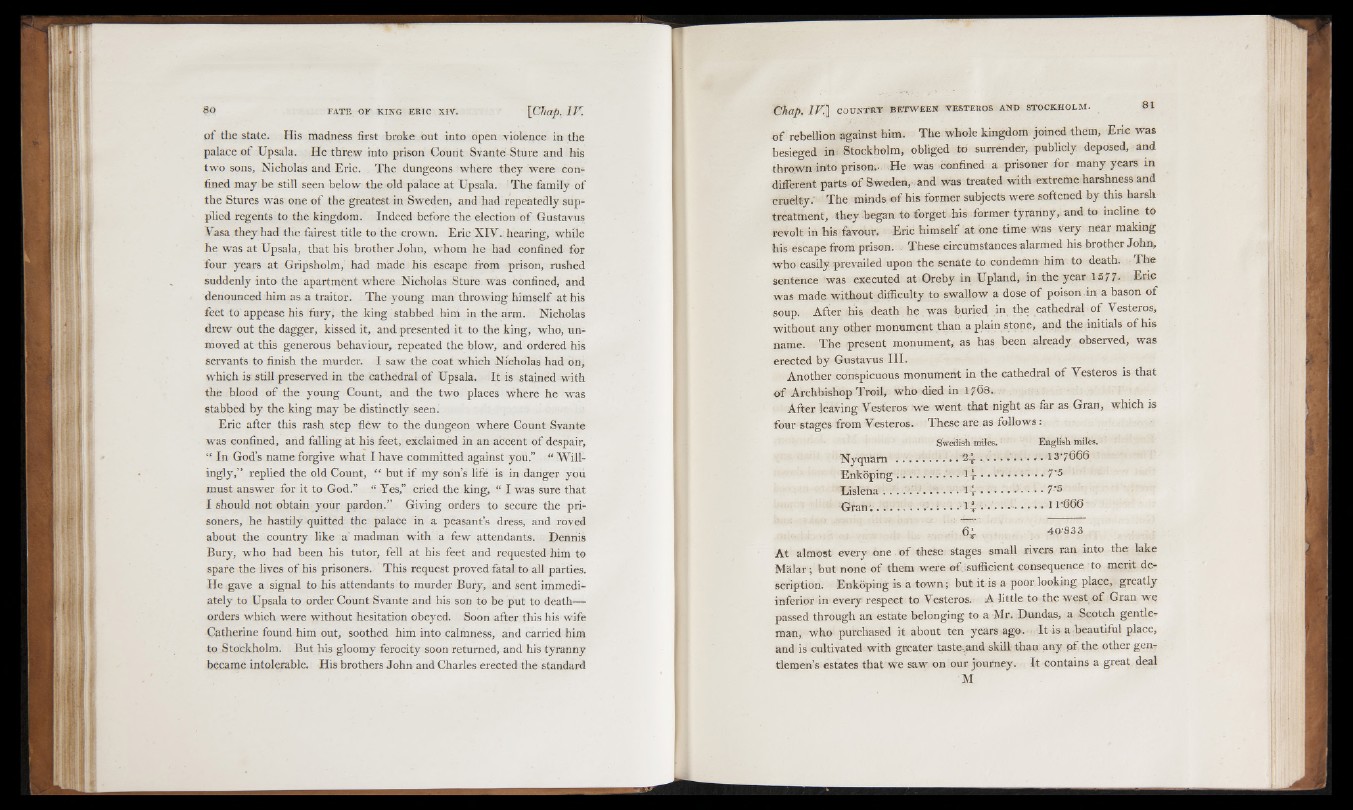
o f the state. His madness first broke out into open violence in the
palace of Upsala. He threw into prison Count Svante Sture and his
two sons, Nicholas and Eric. The dungeons where they were confined
may he still seen below the old palace at Upsala. The family of
the Stures was one o f the greatest in Sweden, and had repeatedly supplied
regents to the kingdom. Indeed before the election of Gustavus
Vasa they had the fairest title to the crown. Eric XIV.. hearing, while
he was at Upsala, that his brother John, whom he had confined for
four years at Gripsholm, had made his escape from prison, rushed
suddenly into the apartment where Nicholas Sture was confined, and
denounced him as a traitor. The young man throwing himself at his
feet to appease his fury, the king stabbed him in the arm. Nicholas
drew out the dagger, kissed it, and presented it to the king, who, unmoved
at this generous behaviour, repeated the blow, and ordered his
servants to finish the murder. I saw the coat which Nicholas had on,
which is still preserved in the cathedral of Upsala. It is stained with
the blood of the young Count, and the two places where he was
stabbed by the king may be distinctly seen.
Eric after this rash step flew to the dungeon where Count Svante
was confined, and falling at his feet, exclaimed in an accent of despair,
“ In God’s name forgive what I have committed against you.” “ Will1
ingly,” replied the old Count, “ but i f my son’s life is in danger you
must answer for it to God.” “ Yes,” cried the king, “ I was sure that
I should not obtain your pardon.” Giving orders to secure the prisoners,
he hastily quitted the palace in a peasant’s dress, and roved
about the country like a' madman with a few attendants. Dennis
Bury, who had been his tutor, fell at his feet and requested him to
spare the lives of his prisoners. This request proved fatal to all parties.
He gave a signal to his attendants to murder Bury, and sent immediately
to Upsala to order Count Svante and his son to be put to death—
orders which were without hesitation obeyed. Soon after this his wife
Catherine found him out, soothed him into calmness, and carried him
to Stockholm. But his gloomy ferocity soon returned, and his tyranny
became intolerable. His brothers John and Charles erected the standard
o f rebellion against him. The whole kingdom joined them, Eric was
besieged in. Stockholm, obliged to surrender, publicly deposed, and
t h r o w n into prison.. He was confined a prisoner for many years in
different parts of Sweden, and was treated with extreme harshness and
cruelty." The minds of his former subjects were softened by this harsh
treatment, they began to forget his former tyranny, and to incline to
revolt in his favour, Eric himself at one time was very near making
his escape from prison.., These circumstances alarmed his brother John,
who easily prevailed upon the senate to condemn him to death. The
sentence was executed at Oreby in Upland, in the year 1577- Eric
was made without difficulty to swallow a dose o f poison.in a bason of
soup. After his, death he was buried in the cathedral o f Vesteros,
without any other monument fhan a plain stone, and the initials of his
name. The present monument, as has been already observed, was
erected by Gustavus III.
Another conspicuous monument in the cathedral o f Vesteros is that
o f Archbishop Trail, who died in 1769. .
After leaving Vesteros we went that night as far as Gran, which is
four stages from Vesteros. These are as follows:
Sw'edisii miles.: English miles.
Nyquam . . . .......^ . . . . . . . . . 1376 66
Enkôping. . I ........... . i ; . . . . •• V. . . 7*5- *
T * l o r . 1 | . 7 *5
Gran ; . . . . . . 11-666
f i g 6 ’ , 40-833
At almost every one. o f these stages small rivers ran into the lake
Malar ; hut none o f them were o f sufficient consequence to merit description.
Enkbping is a town; but it is a poor looking place, greatly
inferior in every respect to Vesteros. A little to the west o f Gran we
passed through an estate belonging to a Mr. Dundas, a Scotch gentleman,
who purchased it about ten years ago. It is a beautiful place,
and is cultivated with greater taste.and skill than any o f the other gentlemen’s
estates that we saw on our journey. It contains a great deal
M